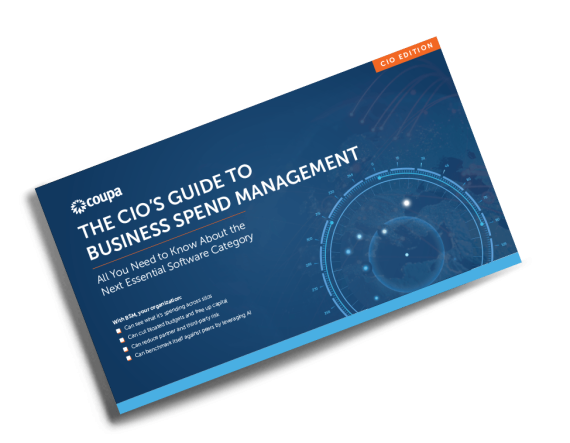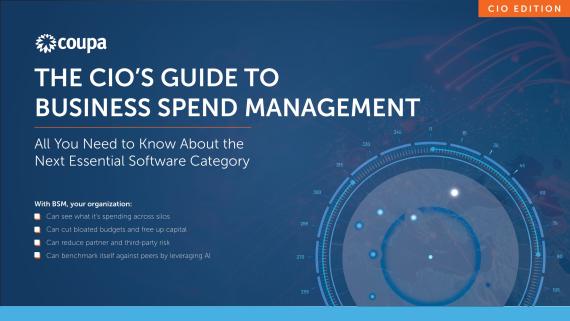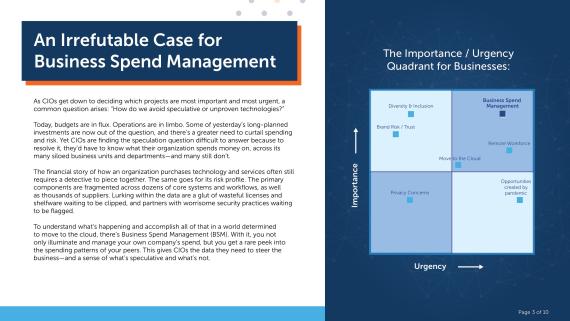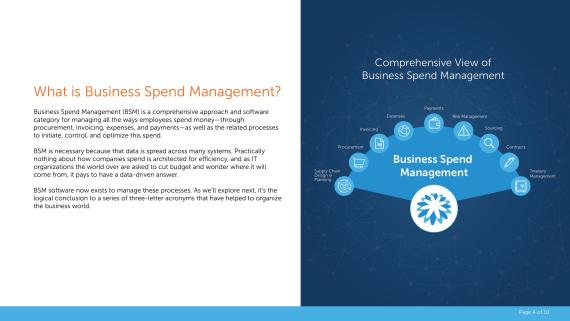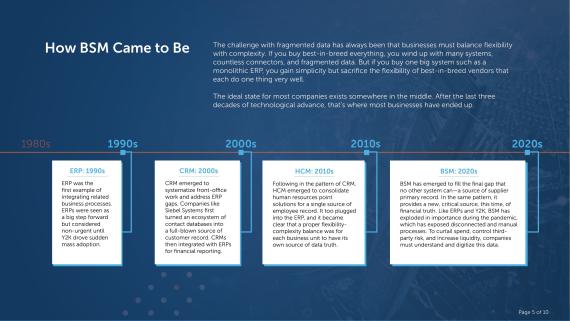The CIO’s Guide to Business Spend Management
As CIOs at enterprise companies grapple with critical decisions to transform the business while also balancing limited resources and cutting IT costs, avoiding speculative and high maintenance technologies remains a challenge. Today's budget uncertainties demand a clear understanding of expenditures across siloed departments and the identification of wasteful technology. Business Spend Management (BSM) illuminates spending patterns, connects fragmented processes and solutions, and mitigates risks – all on one easy-to-use platform.
Digitally transform your organization while keeping IT spend within budget. Curtail risk and replace complexity with a single platform.
Download this e-book to learn:
- What BSM is and how it enables IT teams to make data-driven decisions
- How a BSM platform provides full visibility into spend and illuminates unnecessary spending
- How a platform replaces disconnected solutions and processes while simplifying integration, and IT maintenance and support
As CIOs are asked to slash technology budgets, a BSM platform provides them with a data-driven understanding of how to do it at minimal cost to operations. Coupa’s platform creates an environment where investments in technology need not be speculative, and big bets don’t have to be big risks. In fact, our platform is built with IT in mind. That’s why our platform offers no-code configuration, pre-built ERP connectors, and open APIs to make Coupa the low risk option with an accelerated Time to Value.
With a comprehensive view of financial and risk data, CIOs can help steer the business based on numbers, not speculations. Eliminate the guesswork by choosing a platform that enables strategic business decisions and provides predictable ROI.
FAQ
BSM is necessary because that data is spread across many systems. Practically nothing about how companies spend is architected for efficiency, and as IT organizations the world over are asked to cut budget and wonder where it will come from, it pays to have a data-driven answer.
BSM software now exists to manage these processes. As we explore in this E-book, it’s the logical conclusion to a series of three-letter acronyms that have helped to organize the business world.
This stands in great contrast to a bundle of point solutions, all evolving in different directions and demanding to be integrated. It also stands in contrast to a monolithic ERP, the usability issues of which inspire workarounds and shadow IT. BSM provides the purpose-built platform, tools, and depth of understanding necessary to make the financial side of the organization more fit, but also the central repository for that data to sustain its own ecosystem of vendors.
And the best part? Community Intelligence powered by AI. For over a decade, Coupa has been safely gathering anonymized and normalized data on how businesses spend. With nearly $2 trillion of spend on the platform, Coupa is proud to announce the ability to benchmark your spend against similar organizations. Or, seek out suppliers based on trusted and verified ratings. This is just the beginning of the depth of insights you can glean from Community Intelligence.
The combination of BSM and Community Intelligence is enough to help medium to large organizations reduce waste and detect hidden budget they can either save or repurpose. In today’s environment, savings like that are welcome and, increasingly, needed.
At the same time, savings will have to come from somewhere. They might as well be decided efficiently. Gartner estimates that IT spend will plummet $300 billion before the end of 2020. As CIOs are asked to slash technology budgets, BSM provides them with a data-driven understanding of how to do it at minimal cost to operations.
BSM helps create an environment where investments in technology need not be speculative, and big bets don’t have to be big risks. With a clear picture that includes financial and risk data, CIOs can help steer the business. They can do it based on numbers, not guesswork—and with that power, their leadership is needed now more than ever.
